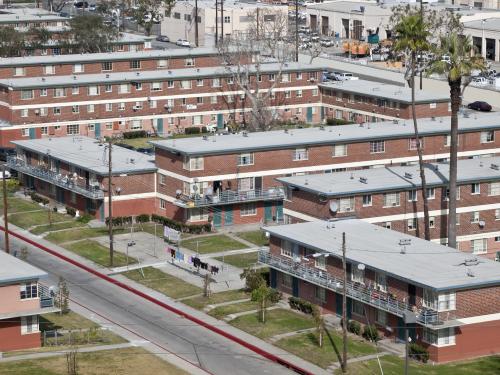This post is part of a series highlighting innovative strategies and tools designed to help increase and diversify the supply of quality rental housing in opportunity and priority reinvestment areas. Over the course of 2017, Brookings Metro convened a Community of Practice on Regional Housing Solutions, bringing together a diverse array of partners from the Baltimore, Chicago, Kansas City, and Minneapolis-Saint Paul regions to share best practices, troubleshoot common challenges, and develop policy solutions that increase access to opportunity through regional housing efforts.
Over the past couple of years, many have made the case for creating and preserving affordability in strong and strengthening housing markets. These opportunity areas provide access to better jobs, schools, and transit—especially in contrast to areas of concentrated poverty—and moving to better areas improves education, earnings, and overall life chances. However, living in those areas is costly. Public capital dollars to fund the construction of new affordable rental housing are dwindling and woefully oversubscribed. The few parcels of land available for new construction in stronger markets are expensive, and new construction faces uphill, costly battles with the forces of NIMBYism. And while buying existing apartment buildings in these markets to create affordability is more efficient and avoids the pitfalls of new construction, these buildings are bought and sold quickly, and the typical complex, subsidy-heavy model cannot compete.
But what if we could harness the speed and volume of private capital that fuels higher prices in these markets to boost affordability? At least two cities are providing a potential model for putting private financing to work for low-income families.
In Chicago, we at The Preservation Compact (a collaborative of housing partners that develops strategies to preserve affordable rental housing) have looked to private market financing and available public resources to create more affordability in opportunity areas. (The Preservation Compact is housed in the Community Investment Corporation (CIC), a non-profit Community Development Financial Institutions Fund lender with a $300 million loan pool to finance the acquisition and rehab of apartment buildings.)
We know from experience that private first mortgage debt, which helps millions of families buy homes every year, is a powerful engine. The private market generally has a strong supply of this financing, which is also available for buyers who purchase apartment buildings. Yet first mortgage debt alone cannot keep rents affordable in pricey strong markets the way it can in low-income neighborhoods.
A strategic government resource can create affordability, however: the project-based voucher (PBV) contract. PBVs provide operating subsidies to pay market rents, including in many strong neighborhoods with higher rents. This helps buildings maintain sufficient income while also housing very low-income families. Lucky for us, the Chicago Housing Authority (CHA) and an inter-jurisdictional suburban program called the Regional Housing Initiative both have available and flexible allocations of PBVs, and are eager to place them in stronger markets.
The market offers private mortgage debt and PBVs offer light touch subsidies to support operations—two efficient resources. But, if these raw materials were here all along, why aren’t developers just buying buildings and putting PBV contracts on them?
Because this approach is off the beaten path. Private owners need an incentive to work with government-issued PBVs, and mission-driven developers accustomed to heavy government funding need more financing to supplement traditional bank debt.
Enter CIC’s new Opportunity Investment Fund: low-cost financing for developers who purchase existing rental buildings in strong markets and keep 20 percent of the units affordable. Borrowers start by getting typical first mortgage debt from their favorite lender (covering 70 to 80 percent of a building’s value). This fund can then go further, financing up to 90 percent of a building’s value at favorable terms.
While the fund itself has not closed, we are moving pilot deals forward, thanks to support from the federal Capital Magnet Fund, and the JPMorgan Chase Foundation. We expect the Fund to close with $30 million in investor commitments sometime in Spring 2018. Altogether, it will help finance 1,500 units of mixed income housing, including 300 affordable units to house very low-income families.
To move from a concept to a concrete program, we looked to peers across the country, including the Greater Minnesota Housing Fund’s NOAH Fund, which is also aiming to preserve affordability in strengthening markets. The Minnesota program also offers low-cost capital to encourage the acquisition of existing buildings in target markets that are on the rise, but still have some affordable units. It provides straight equity that can stretch to 97 percent of value to accommodate additional affordability, without necessarily relying on PBVs. The fund has deployed $10.2 million for over 300 units since June 2017.
These two models are unusually efficient in a world where “affordable” typically means slow and scarce public capital subsidies. The funds are unique because they:
- Create affordability in strong markets without costly new construction;
- Leverage the majority of financing from first mortgage capital;
- Allow for speedy transactions; and
- Allow both for-profit and non-profit owners to participate
We believe the basics of this model can be replicated, depending on the strengths and resources that local markets can bring to the table. For instance, the Chicago region has access to flexible PBVs that create affordability via a contract. Minnesota has capacity and interest to create an equity fund, with developers ready to take on a new model. Many markets with apartment buildings likely have private mortgage financing that can be coupled with a fund or other strategic resources to create affordability.
Finally, the value of transferring wisdom and experiences across jurisdictions cannot be understated. How much was that sharing worth? For us it meant the difference between spinning an idea, and catapulting a program. Priceless.
Editor’s note: JPMorgan Chase & Co. is a funder of the Metropolitan Policy Program at Brookings.
The Brookings Institution is committed to quality, independence, and impact.
We are supported by a diverse array of funders. In line with our values and policies, each Brookings publication represents the sole views of its author(s).







Commentary
Making strong housing markets affordable with private, public, and long-distance partners
January 29, 2018